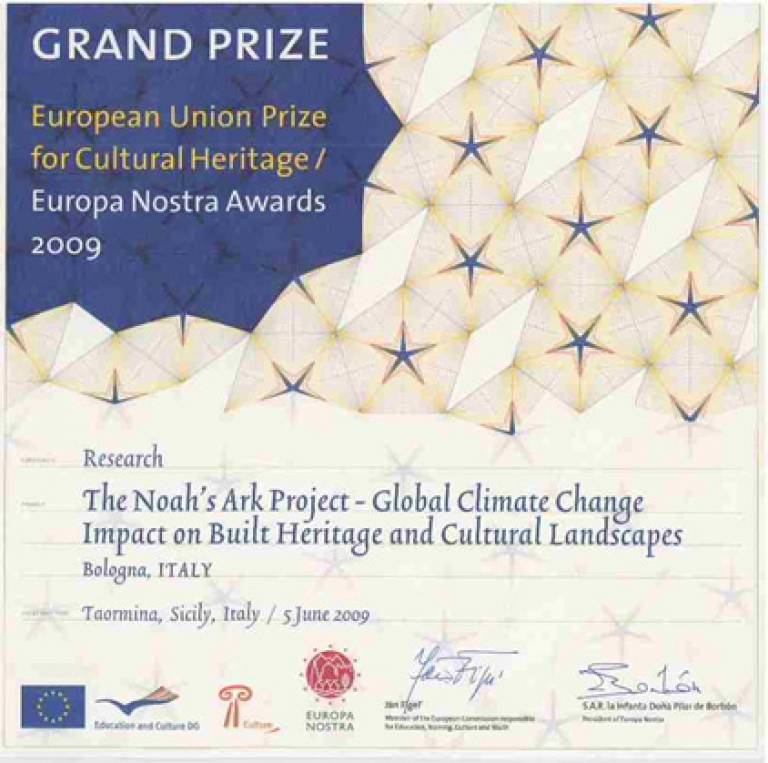Europa Nostra award
22 December 2011

The EU 6th Framework Programme for Research project, Noah's Ark in which UCL is a core partner has won an Europa Nostra Award.
The award for scientific research on the impact of global climate change on the built heritage and cultural landscapes recognises the research achievements of the European interdisciplinary research consortium that has mapped and modelled for the first time the likely impacts of a changing climate on the cultural heritage in Europe.
The Noah's Ark project examined the processes of material change in building materials and ensembles, and the indoor environments of historic buildings that often house irreplaceable fixtures, fittings, furniture and decorative art. Important agents of change that were studied include higher temperatures, precipitation, Flooding, Shifting seasons, warmer winters and rising sea levels, as well as synergistic effects such as wind-driven rain. The impacts that were studied include accelerated decay of historic materials, changes in migration and species in insect pests and lichen and the effects of wetting and drying of historic buildings.
UCL's Institute for Sustainable Heritage was responsible three key tasks in the project:
The UCL team developed the European map for wind-driven rain for the periods 2010-2039 and 2070-2099 using data outputs from the General Hadley Model HadCM3 and the Regional Hadley Model HadRM3 and the moderately optimistic IPCC SREC A2 scenario. Maps of the changing moisture content of spruce wood a timber widely used in historic structures, brick and sandstone during the 21st century were also developed.
The UCL team applied Heat and Moisture movement computer models to examine the effect of climate change on historic buildings and used the models to examine the effects of different drying strategies. Drying strategies are important because, as the risk of damage to cultural heritage by flooding and the saturation of the building fabric increases, pressure will build to bring buildings back into use for heritage conservation, health, the economy and community cohesion. Tensions between the demand for rapid repair and long-term conservation will result. The UCL team simulated submerging a wooden church in water for 40 days and nights; it looked at the total moisture content of the building fabric over time and then studied the effect of natural drying and forced drying.
After 40 days of wetting, water penetrated the wooden walls of the church only a few centimeters in from both the external and internal surfaces. Without flooding, the moisture content of wooden walls is expected to decrease slightly in the 2020s and 2080s, while forced drying of wooden walls is expected to lead to over drying, and large changes in the internal moisture profile of the wood heightening the risk of damage.
The UCL team was also responsible for producing guidelines proposing adaptation strategies for cultural heritage management in the face of climate change. These guidelines are aimed at heritage owners and managers of historic buildings and collections, policy makers and national heritage organizations.
Professor May Cassar, Director of the Institute for Sustainable Heritage, and the UCL team leader on the Noah’s Ark project said:
"This award is outstanding recognition of truly ground-breaking research carried out at UCL and by the whole European consortium. This award is only the start. We are building on this success, having secured further EC support and a commercial publisher for The Atlas of Climate Change Impact on European Cultural Heritage Scientific Analysis and Management Strategies. It is simply amazing that as a result of Noah’s Ark so many countries including the US, NGOs including ICOMOS and ICCROM, UN bodies such as UNESCO, the World Bank and other European institutions including the European Parliament and the Council of Europe are beginning to build actions based in our research. Funding permitting, we have great plans to take this research forward."
UCL context
The UCL Institute for Sustainable Heritage was originally established with the support of three UCL departments: The Bartlett Faculty of the Built Environment, the Institute of Archaeology, and the School of Library, Archive and Information Studies. It consists an international interdisciplinary research team which identifies research gaps for the physical protection of the moveable and immovable heritage that only interdisciplinary collaboration can tackle.
The Europa Nostra Awards were jointly launched in 2002 by the European
Commission and Europa Nostra to celebrate outstanding initiatives among the many facets of Europe's cultural heritage in categories ranging from the restoration of buildings and their adaptation to new uses, to urban and rural landscape rehabilitation, archaeological site interpretations, and care for art collections. Prizes are also awarded for research, dedicated service to heritage conservation by individuals or organisations and education projects related to cultural heritage.
 Close
Close

